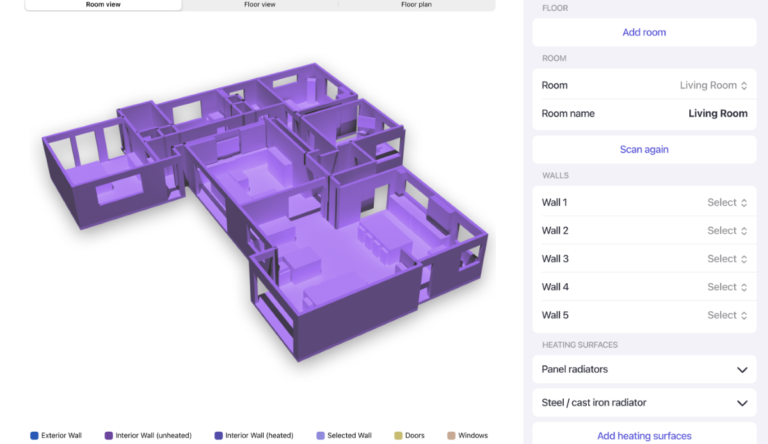German software company Autarc launched a platform for residential heat pump projects, which includes design, planning and customer project management functionality. It uses LiDAR imaging to enable heat load and hydraulic balance calculations, as well as visualizations.
German startup Autarc has launched an online platform to make it easier for heating, ventilation and air conditioning (HVAC) professionals to sell, design and install residential heat pump systems. The software supports the heating planning process, including heating load calculations per room, hydraulic balancing and system design.
In addition to project planning and design steps, it enables documentation for regulatory and certificate application purposes. Integrations with customer relationship management tools and other specialized software are available.
Potential customers with heat pumps can perform remote sensing with light detection and ranging cameras (LiDAR). Such cameras are standard on Apple devices, starting with the iPhone 12 and iPad Pro 9G.
“Autarc’s LiDAR scan can capture an existing 175 m² building in just 15 minutes and then automatically calculate the heating load and hydraulic balance,” the company said in a statement.
“Exterior walls, interior walls, sloping roofs, stiles, windows and doors are all automatically captured by the LiDAR scan and can be easily reworked in the 3D model. This technology makes it possible to capture the geometry of spaces and building structures, leading to greater accuracy in project planning.”
In addition, a 2D map can be derived from the LiDAR scan to create detailed floor plans to visualize properties, plan pipework and create demand-oriented energy performance certificates, Autarc said.
The company, founded in 2023, says the software, which is sold via subscription, is already used “in more than 30,000 single-family homes throughout Germany.”
Autarc has raised seed funding from a group of investors including PropTech1 Ventures, based in Germany, and Better ventures, a US-based venture capital firm.
This content is copyrighted and may not be reused. If you would like to collaborate with us and reuse some of our content, please contact: editors@pv-magazine.com.


